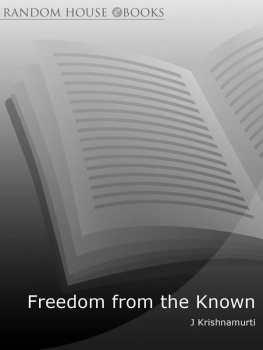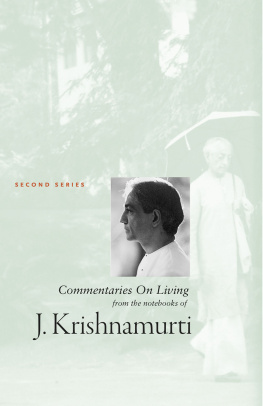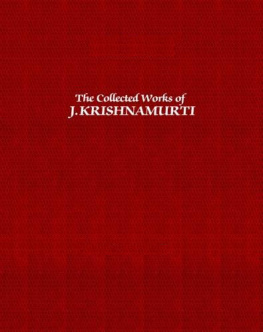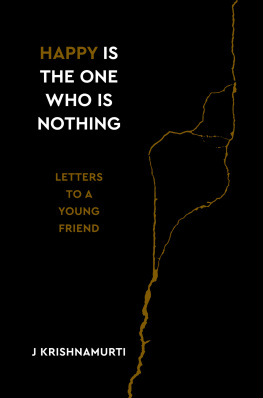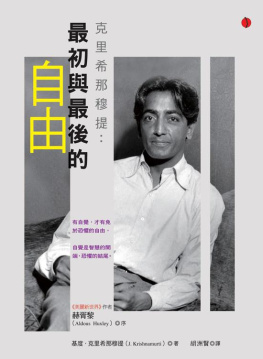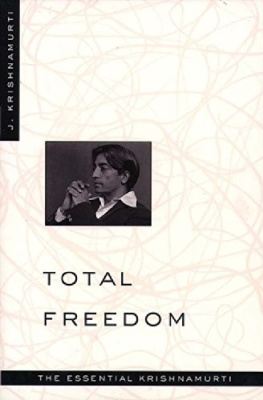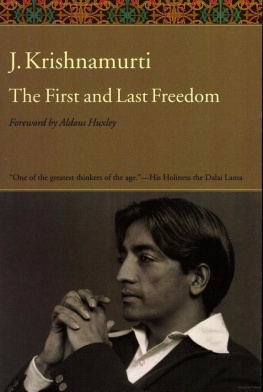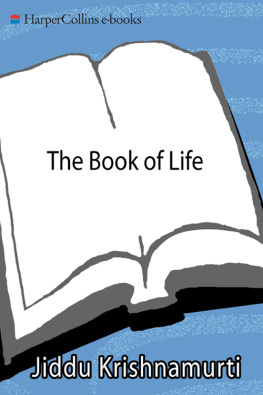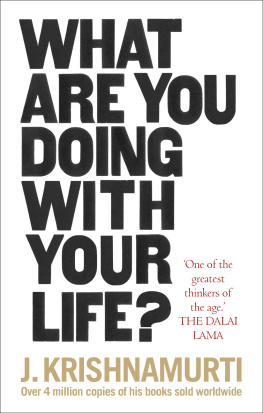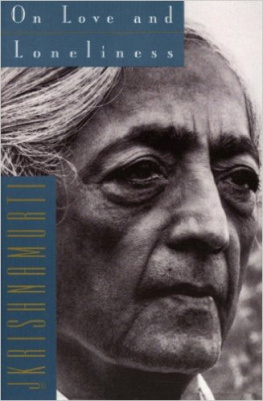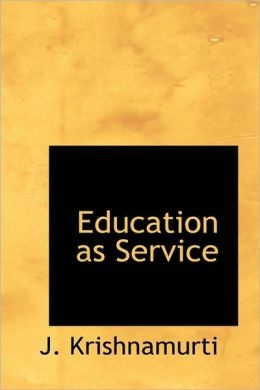FREEDOM
from the
KNOWN
J. Krishnamurti
With a foreword by David Skitt
Edited by Mary Lutyens

This eBook is copyright material and must not be copied, reproduced, transferred, distributed, leased, licensed or publicly performed or used in any way except as specifically permitted in writing by the publishers, as allowed under the terms and conditions under which it was purchased or as strictly permitted by applicable copyright law. Any unauthorised distribution or use of this text may be a direct infringement of the authors and publishers rights and those responsible may be liable in law accordingly.
Version 1.0
Epub ISBN 9781407060798
www.randomhouse.co.uk
1 3 5 7 9 10 8 6 4 2
This edition first published in 2010 by Rider, an imprint of Ebury Publishing
Ebury Publishing is a Random House Group company
Copyright 1969, 2010 Krishnamurti Foundation Trust Limited, Brockwood Park, Bramdean, Hampshire SO24 0LQ, UK
J Krishnamurti has asserted his right to be identified as the author of this work in accordance with the Copyright, Designs and Patents Act 1988.
All rights reserved. No part of this publication may be reproduced, stored in a retrieval system, or transmitted in any form or by any means, electronic, mechanical, photocopying, recording or otherwise, without the prior permission of the copyright owner.
The Random House Group Limited Reg. No. 954009
Addresses for companies within the Random House Group can be found at www.randomhouse.co.uk
A CIP catalogue record for this book is available from the British Library
The Random House Group Limited supports The Forest Stewardship Council (FSC), the leading international forest certification organisation. All our titles that are printed on Greenpeace approved FSC certified paper carry the FSC logo. Our paper procurement policy can be found at www.randomhouse.co.uk
Printed and bound in Great Britain by CPI Cox & Wyman, Reading, RG1 8EX
ISBN 9781846042133
Copies are available at special rates for bulk orders. Contact the sales development team on 020 7840 8487 for more information.
To buy books by your favourite authors and register for offers, visit www.randomhouse.co.uk
Contents
About the Author
J IDDU K RISHNAMURTI was bornon 12 May, 1895 in Madanapalle, India. In early adolescence he came to the attention of the influential theosophists Annie Besant and C. W. Leadbeater, who educated him, believing him to be a future spiritual leader. Krishnamurti later broke away from the Theosophical Society and travelled internationally as an independent speaker and writer on fundamental human issues. George Bernard Shaw declared that he was the most beautiful human being he had ever met and Aldous Huxley became one of his close friends.
He held many dialogues with the eminent physicist David Bohm, and several with Buddhist scholars and Jesuits. Whether discussing politics with Indira Gandhi, debating philosophy with Rupert Sheldrake and Iris Murdoch, or challenging his audience to test the truth of his words, Krishnamurti engaged fully with every aspect of the human condition.
He was regarded by many as a great teacher, an extraordinary individual with revolutionary insights; Joseph Campbell, Alan Watts and Eckhart Tolle have all acknowledged their debt to his writings. In later life Krishnamurti spoke at the United Nations on the subject of peace and awareness, and was awarded the 1984 UN Peace Medal. He died in 1986 at his home in Ojai, California.
M ARY L UTYENS (19081999) was a British biographer and novelist, who was well versed in Krishnamurtis teachings. She first met Krishnamurti as a small child in 1911 and remained dedicated to him until his death in 1986, writing a number of books about him and, at his suggestion, editing Freedom from the Known.
D AVID S KITT is a trustee of the Krishnamurti Foundation in Britain and the editor of a number of books of Krishnamurtis talks and dialogues.
About the Book
J IDDU K RISHNAMURTI is regarded as one of the greatest thinkers and spiritual teachers of all time. Echkart Tolle, Joseph Campbell and Alan Watts are among those indebted to his writings.
This classic work distils Krishnamurtis key ideas on the problems we face as we try to make sense of our lives. Provocative and iconoclastic, he challenges us to strip away our preconceptions, to forget all we think we know about subjects such as love, violence, beauty and death, and to discover our true natures in the here and now. Once we change ourselves, we can change society and the world in which we find ourselves, we can change society and the world in which we find ourselves. Understanding ourselves marks the beginning of wisdom.
Change is possible. It is a question of awareness. Here, Krishnamurti gives us the means to shake off fear and to find truth. He offers freedom from the known.
Foreword
More than seventy books by Krishnamurti have been published and new editions of his works are still appearing a quarter of a century after his death. Freedom from the Known, however, has always stood out as an exception to the others. Firstly, this is because Krishnamurti himself suggested it to Mary Lutyens, a professional author, even giving her the title. But when she asked what kind of a book it should be, he replied, I leave that to you. So she decided to begin by listing the main topics covered in his talks in the years 1963 to 1967, and then to select the passages from those talks that she judged were most clearly or beautifully expressed. The resulting book, she felt, would then constitute a Krishnamurti primer.
One of the intriguing and unusual aspects of Krishnamurtis oeuvre is that its sheer volume material equivalent to four hundred average-sized books makes it very hard for anyone to be an authority on it; a fact that Krishnamurti, with his radical questioning of any kind of religious, political, psychological or philosophical authority, would no doubt have welcomed. It is therefore difficult for a single book to be described as an authoritative or definitive primer (in later years Krishnamurti would go deeply into some other issues), but Mary Lutyenss compilation is certainly the most readable exploratory primer the finest collection of nuggets, as it were, that we have.
The question the new reader of this book might put is: how much is something that was born of the turbulent, antiestablishment sixties relevant to the world of today? Wasnt there a rebellious mood of the younger generation at that time which it later abandoned? Is Krishnamurti therefore out of date? One reason to think he is not is that what Krishnamurti said clearly applies to much of human history and not just to our times. But there is also a very strong case for saying that his views are even more relevant now in the early twenty-first century than ever before.
What is the evidence for this? It rests basically on the fact that we live in a time of growing human interdependence, whether it be the economy, financial markets, politics, pandemics, or climate change. Any major event in one of these areas has repercussions in all of them and has an impact worldwide. All the problems in these areas are interconnected and demand, as a UK government report has said of climate change, unprecedented international cooperation. It is increasingly clear that it is impossible for one country to protect its national interests without taking into account the interests of others. Failure to do so in the twenty-first century will inevitably spawn conflict and insecurity.

